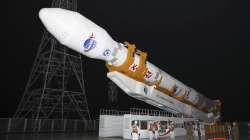South Korea partially suspends inter-Korean agreement after North put spy satellite in orbit
North Korea says it has sovereign, legitimate rights to launch spy satellites to cope with what it calls intensifying US-led threats. But UN Security Council resolutions still prohibit any satellite liftoff by North Korea, viewing them as covers for testing its long-range missile technology.

Hours after North Korea claimed it launched a military spy satellite, South Korea said it would partially suspend an inter-Korean agreement to restart frontline aerial surveillance of North Korea. The North’s claim hasn’t been independently verified; the Pentagon said it was still assessing the success of the launch, while Japan stated there has been no confirmation that the North Korean satellite entered orbit. But the United States and its allies still quickly condemned the North Korean launch, which they believe was meant to improve the country’s missile technology as well as establish a space-based surveillance system.
North Korea says it has sovereign, legitimate rights to launch spy satellites to cope with what it calls intensifying US-led threats. But UN Security Council resolutions still prohibit any satellite liftoff by North Korea, viewing them as covers for testing its long-range missile technology.
North Korea violates UN resolution: South
Heo Tae-keun, South Korea’s deputy minister of national defence policy, told a televised briefing that the North’s latest satellite launch was not only a clear violation of UN resolutions but also “a grave provocation that threatens our national security.”
Heo said South Korea would respond by partially suspending the 2018 inter-Korean tension-reduction agreement later Wednesday to resume aerial surveillance activities at the border. He said the decision was approved at South Korea’s Cabinet Council meeting earlier Wednesday.
He added that based on the solid military alliance with the US, South Korea will “promptly and strongly punish” North Korea if it uses the South Korean step as a pretext to launch another provocation.
What is 2018 North Korea-South Korea peace deal?
The 2018 agreement, struck during a short-lived era of reconciliation between the rival Koreas, created buffer and no-fly zones along the countries’ heavily fortified border. Under the deal, the Koreas were required to halt frontline aerial reconnaissance of each other and live-firing exercises and removed some of their guard posts and landmines at border areas.
The deal invited withering conservative criticism in South Korea with critics saying it significantly restricted the operation of the country’s aerial surveillance assets, which are much more superior to North Korea’s. They also accused the deal of heavily benefiting North Korea, because it only called for mutual reductions of conventional military strength while leaving the North’s growing nuclear arsenal intact. South Korea has no nuclear weapons.
(With inputs from agency)